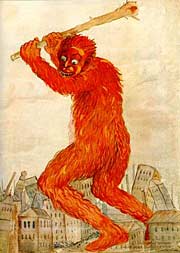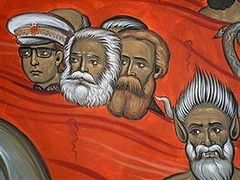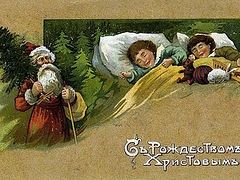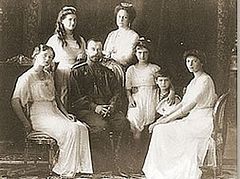Sin clouded mind of our people. They grope in the dark without light, and he maketh them to stagger like a drunken man (Job 12:25).
Epistle of St. Tikhon, Patriarch of Moscow and all Russia
 An anti-Bolshevik poster from the civil war period in Russia. According to St. Seraphim of Sarov, the devil was the first revolutionary, who rebelled against God. That is why all revolutions are adverse to Christianity and have a diabolic origin. It is impossible to imagine a humble and meek Christian being a rebel, a revolutionary. Verily, the devil is the true father and spiritual pilot of all revolutions in the world. They serve his goals and purposes, his strivings and deeds to destroy the world order and to overthrow the God-established lawful authorities. An accurate and unbiased analysis of Russian revolutions in the 20th century shows they were no exception to this rule, being apparently of diabolic nature. That is why the famous pastor of Kronstad and all Russia St. John of Kronstadt raised his voice to say formidable words of correction to those who disseminated sedition and revolutionary spirit, and made an accurate and terrible final diagnosis: "Russia has become a madhouse". We find the same phrase in volume 1 of "Memoirs" by Duke N.D. Zhevakhov, a former friend of the chief prosecutor of the Holy Synod. Many other eyewitnesses point out mass insanity and frenzy during those years. Thus, Metropolitan Seraphim (Chichagov) dedicated one of his bright sermons entirely to demon possession and its contemporary manifestations ("Homily for the 23rd week after Pentecost. On demon possession").
An anti-Bolshevik poster from the civil war period in Russia. According to St. Seraphim of Sarov, the devil was the first revolutionary, who rebelled against God. That is why all revolutions are adverse to Christianity and have a diabolic origin. It is impossible to imagine a humble and meek Christian being a rebel, a revolutionary. Verily, the devil is the true father and spiritual pilot of all revolutions in the world. They serve his goals and purposes, his strivings and deeds to destroy the world order and to overthrow the God-established lawful authorities. An accurate and unbiased analysis of Russian revolutions in the 20th century shows they were no exception to this rule, being apparently of diabolic nature. That is why the famous pastor of Kronstad and all Russia St. John of Kronstadt raised his voice to say formidable words of correction to those who disseminated sedition and revolutionary spirit, and made an accurate and terrible final diagnosis: "Russia has become a madhouse". We find the same phrase in volume 1 of "Memoirs" by Duke N.D. Zhevakhov, a former friend of the chief prosecutor of the Holy Synod. Many other eyewitnesses point out mass insanity and frenzy during those years. Thus, Metropolitan Seraphim (Chichagov) dedicated one of his bright sermons entirely to demon possession and its contemporary manifestations ("Homily for the 23rd week after Pentecost. On demon possession").
In particular, Vladyka said in his sermon: "Where are our possessed? They have shed so much blood during recent years, tearing people to pieces with their bombs, taking the best men from the country, not sparing hundreds of victims and innocent children for the sake of their infernal plan, committing murders, destroying themselves, as if it were unavoidable, and ending their lives by rejecting Christ’s Cross before the execution: who does not know them? Who did not see them raging in villages and manors, when they made terrible shows burning down centuries-old buildings, throwing things out of them to the drunken peasants, torturing horses and cattle with axes and pitchforks, boozing and making merry on the scorched ruins, and to crown it all, desecrating churches? It was they who involved the factory and village youth in madness, who still frighten people with arsons, theft, night debauches, threats, revenge and rejection of God and all that is sacred and dear to Russian people?!"
The year of 1917 surpassed by far all the previous periods of Russian history by the intensity of its frenzy: "Demons dwelled in souls of Russian people and they have become possessed with devils", the discerning Russian theologian, former spiritual father of the Royal family, Bishop Theophan of Poltava, wrote. "It was intoxication with freedom, dissoluteness and impunity", Duke Zhevakhov writes in his memoirs. "Savage jeering at the morals and law, an inconceivable satanic malignance, and under such circumstances all the attempts of correction only whipped up more emotions". (Memoirs, vol. 2, p.14). According to philosopher Ivan Ilyin, the revolution of 1917 exposed all the base passions and vices of the Russian people, revealing an abyss of the most sinful, mean and shameless, rude and ruthless. Hellish fire seemed to blaze over Russia, a host of Gadarene legions of demons struck her body and totally destroyed her moral foundations, even the basic covenants. Many were stricken with exasperation about each other, a strange anthropophobia. At that time it was nothing much to kill an innocent person, to rob, to destroy, to set something on fire. So the external and internal enemies of Russia, making use of the war hardships, whipped up the sinful emotions of the crowd. At the onslaught of these forces, "Russia collapsed, overwhelmed by revolution," wrote V.F. Ivanov, just at the peak of her development" ("The Russian Intelligentsia and Freemasonry", p.31). "The Diabolic plot against Russia and her Tsar" (F. Vinberg) succeeded.
This fall of the God-bearing country was prepared during several centuries and was allowed by God for the grave sins of the Russian people: "For the negligence of her Divine vocation, Russia committed herself to the enemy of the human race and became a satanocracy. There came total possession by evil spirits; the upper layer of society had them—and Russian majesty collapsed. Starvation and chaos are today the natural inheritance of Sovdepia (State of Soviet Deputies) ("Russky Palomnik" 320, p. 89; 1999).
"Russia, like France in the 18th century has gone through a period of total madness and only through suffering and tears is she beginning to recover from her severe disease", wrote Anna Vyrubova, maid of honour at Her Imperial Majesty, a friend of the last Russian Empress, in her diary many years after those terrible events.
In her letter to Princess Victoria, Grand Duchess Elizabeth compares the state of the Russian people with delirium of an insane person.
"Everything that was gathered over centuries is destroyed—destroyed by our own people, whom I love with all my heart. It is true, they were morally ill and blind, not seeing where they were going. My heart aches, but I do not feel bitterness. How can I criticize or condemn a person, when he is insane and in delirium? (Quoted from the book, The Orthodox Tsar-Martyr, by Igumen Seraphim, p. 67).
Actually, the demonic essence of the revolutionary element was brilliantly and prophetically described by F. Dostoevsky (The Possessed, and Raskolnikov’s prophetic dream in Crime and punishment are vivid evidence of it). But while stirring up and indulging the revolutionary flame, the Russian people could not imagine what results this dangerous game with fire could bring. Calling to demolition and revolt ("It’s a storm!... Let it break in all its fury!"—Maxim Gorky), death of the old world (Blok, Balmont, Bryusov and other Russian poets, who blazed with the revolutionary spirit and called like Blok to "listen to the music of revolution"—that is the bloody mass of arsons, murders and pogroms; or blasphemed like Esenin, who wrote on the walls of Sretensky monastery [in Moscow]: "god calved" and who according to his own confession sold his soul to the Fiend. Literary heralds of the revolution sawed off the bough on which they were sitting. And the long-awaited storm broke indeed. Few of them were spared—in particular those who betrayed God, honor and conscience, and who could change their color and put up with the new power.
The Russian people welcomed the news about the abdication of Tsar Nicholas II. "February 1917 was the time of total insanity among the people. In the streets numerous demonstrations took place. On squares rallies had no end. All congratulated each other on the fall of tyranny." This virus of insanity infected also the clergy who cherished illusions that after the Tsar’s abdication nothing would change in the status of the clerical order" (Stepanov A.D., Chernaya sotnya, p.63).
The theme of Russia’s madness is vividly reflected in the poetry of Maximilian Voloshin, who during those insane and bloody years managed to draw near to Christianity, stepping aside from his former occult interests. In his poem "Moscow" written in March 1917, he reflected on the dominance of the red element, that brought people "blood", "execution", and "trial":
At the moat beside the execution place
Before the Church of the Protection
They pronounce obscene,
Non-Russian words.
No candles are lit,
No bells call for the liturgy.
All chests are marked with red
And a red cloth flutters in the wind.
Even more distinctly does the poet perceive the thickening of the ungodly, devilish element in the Metropolitan of Petrograd being captured by the Bolsheviks:
Through the void of the sovereign power,
Once gathered by Peter,
All the devilry poured into this house
And on the empty throne
Over the shaky marshes
They whirl a devilish round dance.
The people, stricken with madness,
Knock their heads against a brick wall
And tears the bonds, like one possessed. ("Petrograd")
He testifies to the possession of the people also in his poem "Trikhinas", where he recalled the prophecies of Dostoevsky and described, how "trichinas dwell in bodies and the spirit of people". By trichinas he means certainly demons. His poems, "From the abyss", "Deaf and dumb demons", "Deaf and dumb Russia" are dedicated to the Russian revolutionary demonology.
The last poem touches upon the Gospel events about driving a demon out of a boy (Mk. 9:17-27) and relates to the demonaical capture of Russia:
Aren’t you possessed with the same spirit,
You, deaf and mute Russia!
The evil spirit robbed you of your mind and freedom
And throws you now to fire, now to water,
Hits you against the rock and drives to the forest.
An even more vivid picture of the bloody Russian revolution of 1917 was painted by a poet and prophet who till recently was little known in Russia, not having been included even in the Russian poetic anthologies of the 20th century (because of his spiritual closeness to the Royal family and loyalty to the Orthodox monarchy), Sergey S. Bekhteev (1879–1954):
Churches and houses are collapsing,
Birches in the park are falling down,
Shouts of blasphemy and threats
Resound like bestial roaring. ("Bell ringer")
A bloody blaze is burning in the sky
One after another manors are burning
Stacks of gathered wheat are burning
And red jackdaws are flying.
("Land and freedom")
Demonological pictures of the revolution at one moment have an association with the image of a bloody old woman:
A hard time of total ruin
Has come as a storm cloud over the country;
And everywhere I see the image
Of a terrible, bloody old woman.
("Land and freedom")
and at another are perceived as the "indomitable mad run" of a demon-possessed wild red steed:
Who, driving fear away,
Can bridle the will of the mad,
Who for his salvation will manage
To bridle a demon-possessed steed
("Red Steed")
The poet does not hesitate to portray the demonic, satanic character of the events in Russia; moreover, he sees a certain historical logic in it. And in the subtitle of the poem "The possessed one" he writes such words: "It was like this and it will be like this". And there is no reason to argue about it:
From of old it was so,
That Mother-Russia had fits of madness,
And after it is over
Her wounded feet take her to the Lord
With wail and pleas, and moans,
With tears of repentance and bows.
("The possessed one")
But few Russians could keep a cool head in this period of general insanity and correctly analyze the proceedings. No doubt, the Sovereign Nicholas II and his August Family were among those few. At that time the spiritual stature of the Royal sufferers was unattainable to the majority of their contemporaries. Their podvig will always remain in the undistorted history of the Motherland and the whole world as an everlasting example to follow for all who are faithful to Christ, as an ideal of genuine royal majesty, humbleness and self-sacrifice. Certainly there were other loyal subjects, who worthily faced these terrible events of Russian history. But the majority of Russian people were insane and possessed...
The result of the final stage of the Russian people’s madness was the consistent extermination of the best layer of our country's society, including many hierarchs of the Russian Orthodox Church, clergy, monastics, as well as of nobility, army officers, merchants and hard-working, prosperous peasants; the demolition of Orthodox churches, historical monuments of architecture, the proclamation of godlessness in the country and deification of the communist leaders, first of all V.I.Ulyanov (Lenin), who once said: "Let 90 percent of the Russian people die. The most important is that 10 percent are left for the time of the world revolution". This is the true scale of the global claims of this revolutionary—a fanatic, about whom Bunin once said: "A bantling, a moral degenerate from his birth, Lenin at the peak of his activities made something villainous and monstrous: he devastated the greatest land in the world and killed several millions of people, and still the world has gone so mad that in broad daylight they argue whether he is a benefactor of mankind or not?" (From his speeches in Paris, February 16, 1924). Putting aside Bunin’s excessive sharpness we can’t but agree that at the least a Nobel Prize winner and one of the last classic authors of Russian literature is quite accurate in his assessment. Another famous Russian writer, A.I. Kuprin, was terrified after his personal meeting with Lenin, not finding any indication of a human soul in him: "Basically, I thought, this man, quite an easy, polite and healthy man, is much more terrible, than Nero, Tiberius or Ivan the Terrible. He has no feelings, no wishes, no instincts. Only one sharp, dry, invincible thought: Destroy when falling" ("Lenin", A snapshot). An agent of Prussian and German intelligence services (a fact that was positively established by Russian secret police in 1917), most possibly a Mason of high rank, Lenin in Russia was called the "most human of humans", and for the deceived possessed people he became a symbol of sanctity ("more holy than all saints"). Is it not a definite proof of that most grave spiritual illness of the Russian people, which is unfortunately not completely cured even today. Mental eclipse and spiritual blindness cover our souls with a thick veil, and Russia’s enemies did not miss their chance: "Using epidemic mental eclipse and religious and moral poverty, the haters of Russia try to destroy in the first line those unique and ancient ideas and values that always ensured phenomenal steadfastness and vitality for the Russian community," wrote Metropolitan John (Snychev) of St. Petersburg and Ladoga in his book, Symphony of Russia (p.419). One of the major values was the centuries-old idea of sovereignty of Holy Russia, and the people’s understanding of the universal importance of the Russian state in the fate of all mankind. A Liberal and pro-Western policy in Russia today means refusal of the traditional Russian ideology and Orthodox statehood, and deviation towards neo-paganism. The harmfulness of this policy is becoming more and more evident.



